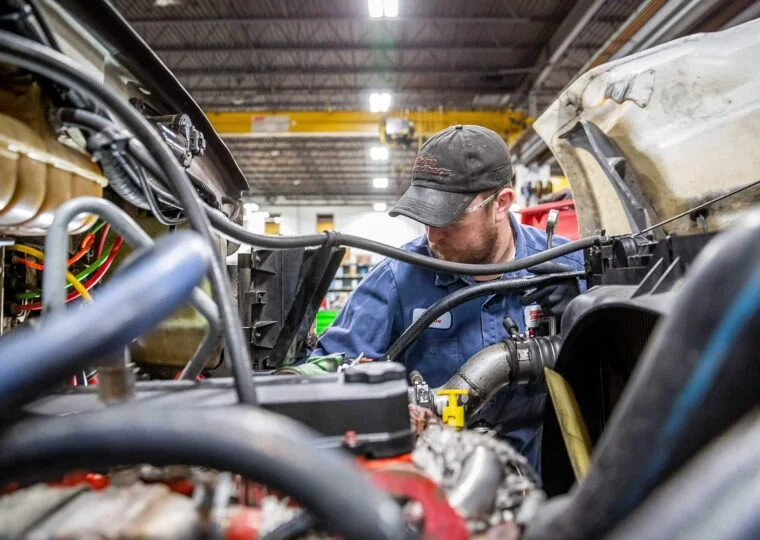Diesel engines are some of the most powerful and long-lasting engines made. In terms of reliability and durability, they are at the top of the list in heavy-duty applications. For those looking to potentially invest in a truck with a diesel engine, understanding more about them, in particular what kind of life expectancy they have, can have a significant effect on the overall decision of whether or not that investment is a good idea. This can be of the highest importance for truck drivers, who will eventually put their livelihood in the care of a diesel engine.
We’re going to take a look at just how long diesel engines can last, and how they compare to the life expectancy of the average gasoline engine. We’ll also dig into the differences between diesel and gasoline, both on a mechanical level and how they each function as fuel sources. In the end, we’ll talk about how long you can expect before you need to rebuild or potentially replace your engine and give you some tips to maximize that lifespan.
Diesel Engines Last Longer Than Gasoline Engines
When it comes down to it, diesel engines last much longer than gasoline engines because they are designed to. Most gasoline engines will need major service before the 500,000-mile benchmark. Diesel engines will be able to easily pass one million miles, often making it to nearly two million miles before starting to show significant wear and performance reductions.
Differences Between Diesel and Gasoline Engines
The major differences between gasoline and diesel engines lie in three main areas. The design of the engine itself, the characteristics of diesel fuel compared to conventional gasoline, and what they are generally tasked with doing.
Engine Mechanics
The first and arguably the most significant differences between the two types of engines are the design and mechanical differences. Diesel engines are largely gear-driven; the gears are difficult to damage, can be repaired without replacement in many cases, and will never lose timing like a belt or a chain can. This gear drive can also extend to having gear-driven components like water and oil pumps. Overall, this gear-based design drastically reduces the risks of parts failing.
Diesel engines are also built with more heavy-duty components like valves, pistons, and so on. These parts are designed to be able to handle the full power of the engine and suffer less wear and tear when in use on those engines. Since diesel engines also have much larger components like crankshafts, camshafts, pistons and cylinders, there are larger bearings used. Those larger bearings are able to facilitate much more oil flow.
More oil flow is perfect because some larger diesel engines will have more than 5 gallons of oil to lubricate them, and sometimes as much as 15 gallons. In comparison, a gasoline engine holds a meek 4-quart or 5-quart capacity. This oil provides infinitely better lubrication and far less wear over time and mileage than other engines. The enhanced lubrication is also no doubt contributing to the far better fuel economy that diesel engines get.
While gasoline engines need to be water-cooled, diesel engines are self-cooling, which means they are far less likely to overheat. There is a significant degree of redundancy with the sensors and thermostat system as well, so even if there are failures, there are safeguards in place to ensure the engine doesn’t overheat. Coolant is also pumped directly into the pistons to regulate temperature.
Diesel vs. Gasoline as a Fuel Source
Anyone that has gotten gasoline and diesel on their hands before can tell you one of the most obvious differences of all: they are very different substances, physically. Gasoline is a very thin, light liquid and has the consistency of a solvent. Diesel is a thicker, heavier fuel that has a texture much more similar to light oil.
This is the first major difference between the two substances. The reason gasoline is closer to a solvent in nature is that it has been much more highly refined than diesel fuel, which makes it substantially more volatile and even corrosive. This is why gasoline can be ignited by a simple spark in the presence of gasoline vapor. Diesel fuel is much less volatile and must be ignited by extreme pressures found in diesel cylinders. Diesel fuel also acts as a lubricant for the entire fuel system.
Gasoline engines will often run between 2,000 and 4,000 RPM, while diesel engines will often operate below 2,000 RPM routinely. It seems like gasoline engines are more powerful because there are far more revolutions, but this actually means that the gasoline engine is doing twice the work of a diesel, for the same capabilities and level of performance.
How Long Should My Truck’s Engine Last Before I Need to Rebuild or Replace It?
While the average light-duty truck or car will need some form of major engine service somewhere between 200,000 and 600,000 miles, a diesel engine can run for much longer. The average diesel engine can run on an almost continuous basis, for anywhere from 1,000,000 to almost 2,000,000 miles before it will need any major work. It’s not uncommon for a diesel vehicle that’s been well maintained and taken care of to be in service for 30-50 years.
 Tips for Maximizing Your Diesel Engine’s Lifespan
Tips for Maximizing Your Diesel Engine’s Lifespan
- Keep Up With Maintenance – This should go without saying, but making sure your scheduled maintenance is done on time, every time, can go a long way toward helping your diesel maximize its time in service. Failing to keep up with basic routine maintenance can lead to significant premature failures.
- Check Your Oil – Of course, you need to make sure you aren’t losing oil to blow by, but you should also make sure that your oil is in good shape otherwise. You can take an oil sample for analysis, and that test can tell you if there are any other fluids leaking into the oil. Finding out that there is a small coolant leak into the oil before it causes major failure is worth the minimal charge to have the oil tested locally.
- Drive Right – One of the major things you can do to keep your engine in top shape is to avoid abusing it. Pushing your engine to do too much under the wrong conditions can ruin any piece of equipment. Operating your diesel properly can be a tremendous help in avoiding repairs.
When to Bring Your Truck In for Engine Diagnostics
Here are some signs that may indicate that it’s time for you to bring your truck in to have the engine checked out:
- Significant loss of performance
- Oil analysis shows significant amounts of coolant or fuel in the oil
- Sudden development of noises
- If your check engine light comes on
Keep Your Diesel Truck Running Smoothly
If you have a heavy-duty truck or any other truck that has a diesel engine, keeping that engine running properly can be the difference between working and downtime. If you’ve seen signs that your engine may need some diagnostic work and potential repairs, bring it to Blaine Brothers, and we can give you an estimate with professionalism and transparency!



 Tips for Maximizing Your Diesel Engine’s Lifespan
Tips for Maximizing Your Diesel Engine’s Lifespan